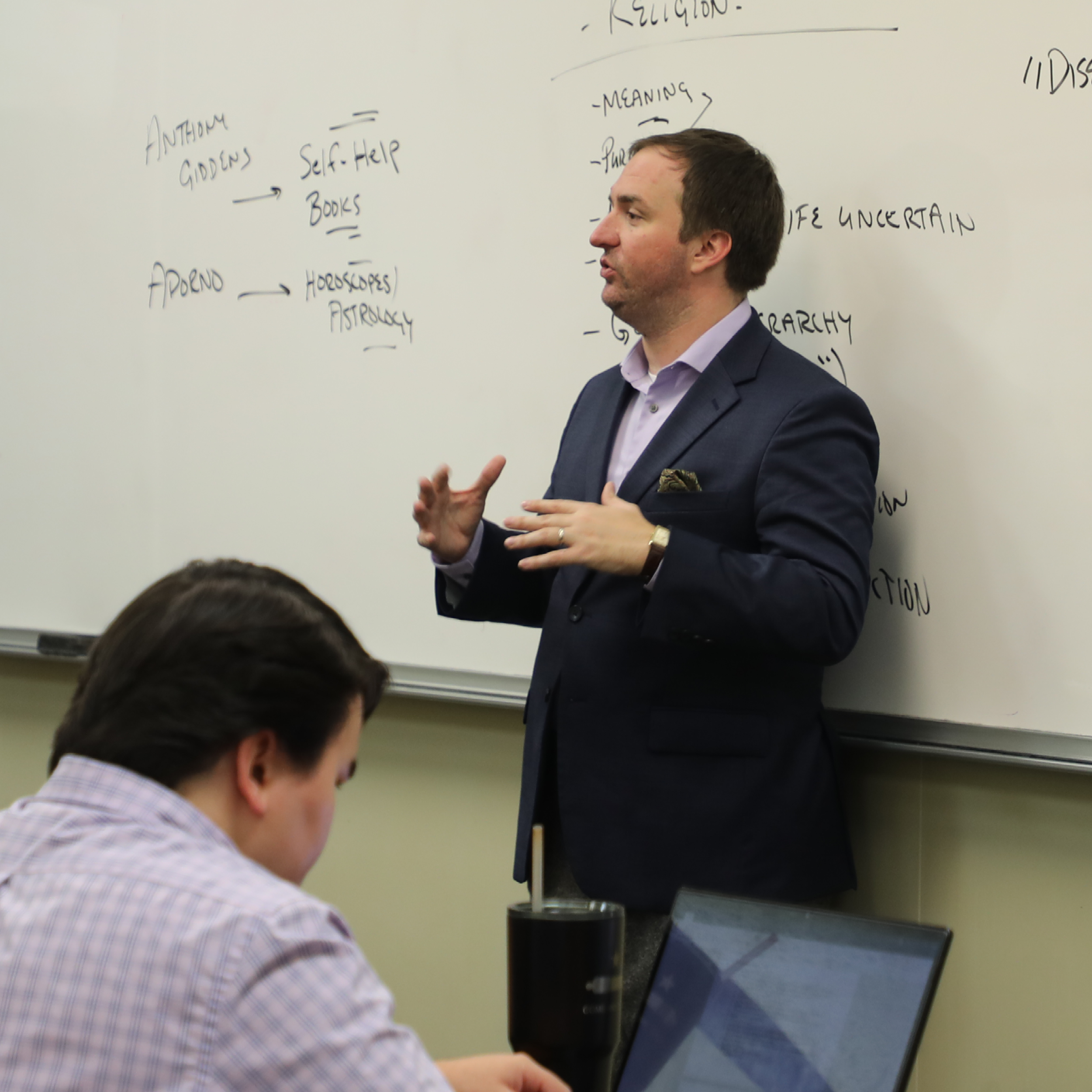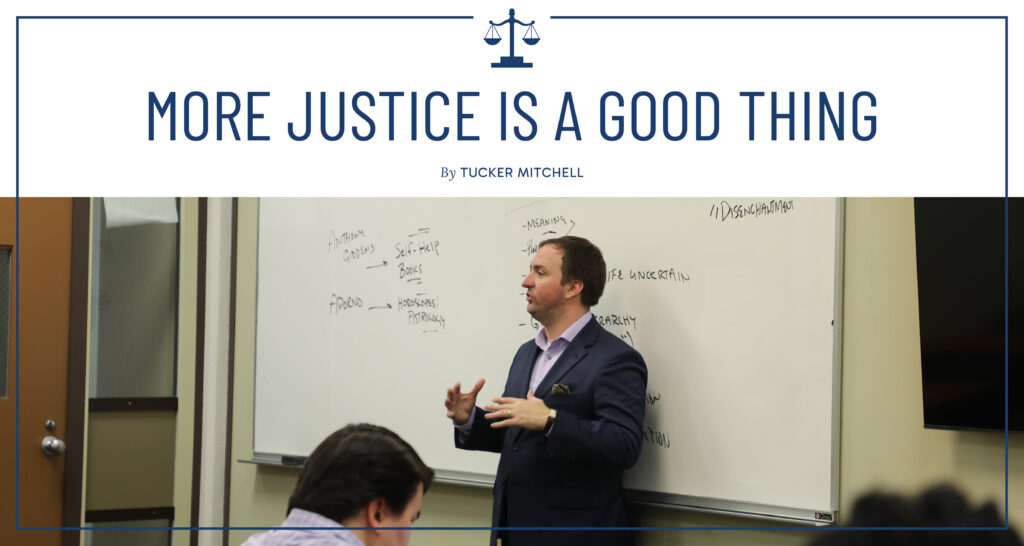December 10, 2024

More Justice is a good thing
More Justice is a good thing
By Tucker Mitchell | Fall/Winter 2024 | FMU Focus Magazine Fall/Winter 2024

FMU’s new criminal justice major will supply needed manpower for the region’s law enforcement organizations, and a promising future for graduates.
Law enforcement organizations across the nation are struggling to fill funded positions. Recent studies show two-thirds to three-fourths of all police and sheriff departments report significant vacancies and hiring backlogs.
The situation in South Carolina is no different. A lack of qualified candidates to fill law enforcement jobs is a serious problem, say state officials.
Now, Francis Marion University is stepping up to help.
The university recently established a new criminal justice major. The expectation is that as it begins to turn out graduates in the next few years, it will be a boon both for local law enforcement seeking well-educated, well-prepared candidates, and for FMU students who want to enter the profession.
Dr. Dillon Tatum, chair of FMU’s Department of Political Science, is the coordinator for the new major, which is a joint venture of the political science and sociology departments at FMU. He says the new degree program, like much of the recent curricula at the university, is based on meeting an identified need in the community.
“In our conversations with leaders in local and regional law enforcement and corrections organizations, it’s clear that there’s a critical need,” says Tatum. “In particular, there’s an increasing demand to have officers with a four-year education. That demand really forced us to think, ‘how can we help? How can we respond? How can we improve their work force?’”
Tatum says the focus of graduates from FMU’s new program will be more on placing officers who are headed into managerial positions in police and corrections organizations. But, he adds, “it’s clear from my conversations with police and law enforcement leaders that this is just a good idea for the criminal justice profession in general.
“Part of that is simply having a quality liberal arts education,” says Tatum. “Individuals who do that become and feel a little more competent in reasoning skills and overall abilities, better focused on critical thinking skills, and have a better awareness of how what they’re doing integrates with society in general. I think that helps.
“There’s good data showing educated officers are less accident prone, less likely to quit, and less likely to suffer from stress and related issues as well. That’s the case nationally, and that’s the case around here, too. It’s a good policy.”
Dr. Fred Carter, FMU’s president, says the new major addresses needs both in the community and at the university.
“Many smaller police departments and sheriff’s offices around the region are going, or will soon go through accreditation,” says Carter. “They need officers and leaders with the credentials we offer to reach those standards, and frankly, we needed this major, too. We already had as many students graduating in criminal justice as we had in political science or sociology. There was great interest there. This just made sense.”
Multiple tracks
FMU has taught criminal justice for a long time, and a number of graduates have excelled in that field. But the courses were always part of a degree in political science or sociology. A concentration requiring 24 hours of specified coursework was offered – it still is for students who enrolled prior to this fall.
The new major enhances those studies by giving students the opportunity to explore a greater variety of topics in political science, sociology, or both, on the way to a degree. Some courses in other disciplines – psychology and forensic chemistry for example – are also included to further broaden students’ knowledge.
The new major features three tracks: Criminal Justice – Crime and Behavior; Criminal Justice – Administration and Policy; and Criminal Justice – Law, Justice and Institutions. All three majors require students to take a half dozen foundational courses, including Introduction to Criminal Justice. The various tracks differ in the follow-on courses.
Easy transition
Dr. Jessica Doucet, chair of FMU’s Department of Sociology, says one particularly appealing aspect of the new major is that it was such a good fit for what the affected departments were already doing.
“The criminal justice degree was created by utilizing existing coursework in both sociology and political science,” says Doucet. “Each department’s contributions can be found in both the required core courses, as well as each of the tracks.”
Doucet and Tatum say the new degree did not require the creation of an entirely new curriculum, or the hiring of new specialists, because it was already an area where the two departments excelled.
“We needed to build a few new special topics courses, but for the most part, we are using courses and resources already on the books,” says Tatum. “We’re doing things we’re good at, which makes for a strong major.
“Historically, we’ve always had good interest in this area,” says Tatum. “Something like 40 percent, and sociology, I think close to 60-70 percent, have had concentrations in this area. We’re optimistic we’ll have very good interest (in the major), especially as we move forward and gain some experience and produce a track record.”
Tatum says he and other faculty have already had considerable communication with both incoming and current students thinking about moving into the new major.
Doucet says the sociology department modified its existing criminal justice track into a criminology and deviance specialization, a relatively simple adjustment.
“This specialization complements the crime and criminal behavior track within the criminal justice degree program,” she says. “Furthermore, it provides students interested in the sociological aspects of crime an excellent opportunity to double major in both sociology and criminal justice.”
Students in any of the criminal justice tracks can attain a double major in either sociology or political science by completing a few additional courses. They’ll gain additional knowledge in their field, and acquire an additional credential that will be useful as they start their professional career.
Real life experience
The new special topics courses will investigate areas like policing and alternatives to incarceration. Most, if not all, of those courses will be taught by practitioners in the field. Some courses will feature a number of practitioners serving as guest lecturers.
“So students, as they near the end of the major, will have an opportunity to hear from, and work with, professionals who are already in the field,” says Tatum.
That dovetails nicely with internships and other experiential opportunities that Tatum says have long been a strong point of both the political science and sociology departments at FMU.
“We’ve been successful in locating and utilizing internships for many of our majors,” says Tatum, “and that’s been true for those on the criminal justice track as well as others. We’ve had interns in the probation office, the state police (South Carolina Law Enforcement Division, or SLED), with local sheriffs, police departments, corrections. We’ve been happy with that, but with our new major in place, we think it will get even better.”






